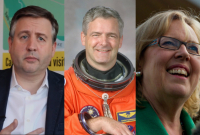Support strong Canadian climate journalism for 2025
It was something like a flashback for Canadian scientists who gathered across the country Saturday to rally in support of their American counterparts, who say they're facing mounting attacks against science.
Science advocate Katie Gibbs said she felt like she was returning a favour. Nearly five years ago, she was in the same place, doing almost the same thing.
In July 2012, she helped organize the "Death of Evidence" rally, protesting cuts to science programs under the former Harper government.
That march paved the way for the advocacy organization that she now heads up, Evidence for Democracy.
The March for Science, which coincides with Earth Day, took place in more than 500 cities around the world — with about 18 scheduled in cities across Canada.
Gibbs said that when Canadian scientists felt threatened, they got a lot of support from their U.S. counterparts.
"I'm not sure if people really know that," she said. "We worked really closely with the Union of Concerned Scientists in the U.S., for example. They were really supportive of us. So now, it's our turn to return the favour to them."
Organizers of the U.S. events portrayed the march as political but not partisan, promoting the understanding of science as well as defending it from various attacks, including proposed U.S. government budget cuts under President Donald Trump, such as a 20 per cent slice at the National Institute of Health.
"We've been quite successful in getting a lot of science changes happening in government," Gibbs said. "So what's happening in the States right now echoes where we were five years ago."
"It sort of feels like, 'Oh, do we really have to keep fighting this?'" she added.
As many as 3,000 people attended Toronto's event, where organizer Evan Savage said the energy was electric.
But he said the underlying message was more sombre.
"I think that to a certain extent we've already seen an erosion of trust in science, and the process of empirical and objective observation," he said, listing denial of climate change, the anti-vaccination movement and people who believe the Earth is flat as examples.
"The things that we're seeing down in the States now, the cuts to the EPA and NOAA, the muzzling of scientists, the removal of language like 'climate change' and other things from websites, this whole spectrum of things is in some ways a pretty direct echo of things we saw under the Harper government."
In Halifax, protesters turned up near city hall to show their support for evidence-based policy-making, some carrying signs like "Defiance for Science," and "Without Science, It's Just Fiction."
Richard Zurawski, a meteorologist-turned-city-councillor who helped organize the event, said it is imperative that politicians combat the creeping influence of pseudo-science at all levels of government.
"If we don't support our science, we're going to lose it," he said. "Everywhere you look, we're balancing climate change against the economy, which is just nonsense ... The environment is way too important."
In Ottawa, Gibbs warned that, in spite of progress under Prime Minister Justin Trudeau's administration, Canadians aren't entirely out of the woods yet. She said American scientists faced similar issues under George W. Bush, but thought they were in the clear when Barack Obama took office.
"For me, it's really been that reminder that it's not enough to have a government today that's for science," she said. "We're really focused on trying to get as much safeguarded as we can. So, to actually try and get protections for scientists legislated."
—With files from Adina Bresge in Halifax.





Comments